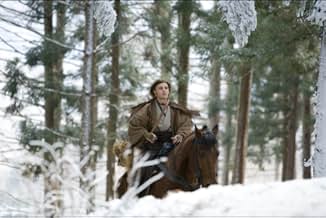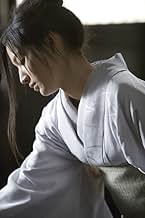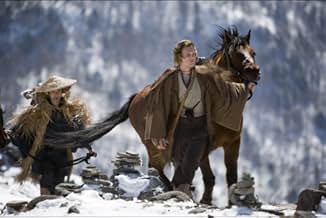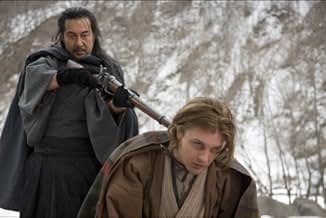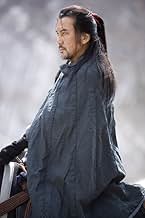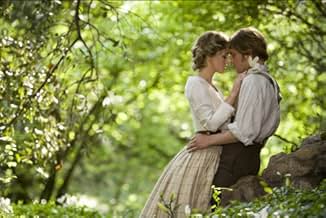IMDb-BEWERTUNG
5,8/10
11.948
IHRE BEWERTUNG
Die Geschichte eines verheirateten Seidenraupenhändlers, der im Frankreich des 19. Jahrhunderts zum Schmuggler wurde und nach Japan reiste, um die Seidenraupen seiner Stadt zu kaufen.Die Geschichte eines verheirateten Seidenraupenhändlers, der im Frankreich des 19. Jahrhunderts zum Schmuggler wurde und nach Japan reiste, um die Seidenraupen seiner Stadt zu kaufen.Die Geschichte eines verheirateten Seidenraupenhändlers, der im Frankreich des 19. Jahrhunderts zum Schmuggler wurde und nach Japan reiste, um die Seidenraupen seiner Stadt zu kaufen.
- Regie
- Drehbuch
- Hauptbesetzung
- Auszeichnungen
- 7 Gewinne & 5 Nominierungen insgesamt
Alexander Brooks
- M. Loiseau
- (as Leslie Csuth)
Empfohlene Bewertungen
This film was actually good, and I expected the worst :)...
It's interesting to watch with somebody of the opposite sex that you don't know well. You could tell a few things about her afterwards, like: Does she like classical music? Does she feel anything when watching splendid landscapes? Is she intelligent enough to figure the story's twist near the end? (I wasn't even close) Does she like "slow" movies? Can she withstand a moderate dose of "drama"? Can she feel Helene's plight?
The only character I really liked was Afred Molina's "Baldabiou". He's an entrepreneur with flavour for life. Likable, tough but sensitive. A "father figure" to "Herve", who sorely needs one with such a bore of a father! Herve's attitude to life was a bit strange to me. My friend said something that's always been there: "he never smiles". True, he barely winces, never seems to be happy, just like drowsily fulfilling a desk job. Schuyler was great in his small role. How a street smart adversary can become a restrained source of practical wisdom! Madame Blanche is also a necessary small role, but that has the life experience Herve will always lack. He surely got sympathy from smart strangers! I didn't get involved in Ludovic Berbek's story, although it's there with the clear intention of moving us. I also thought all this story of "marital unhappiness", infertility and she crying as they made love was a bit contrived. I will never like Keira, but at least she doesn't look like a "tomboy beanpole" (!) as she said on one interview. Which wouldn't be becoming for her "modest wife" role. She's not as good as her Guinevere, but at least she does her rather plain role without showing off. She doesn't look anorexic like in other roles. Maybe she didn't endure wearing a corset like on "Pirates of the Caribbean".
The best review I read was "Grady Harp from United States". I think it deserves to be the one you read first.
My favourite scene is when the local baron shows cold Herve the peaceful place he and his ancestors enjoy for watching nature and connecting with nature. I also wanted to "have a garden" after watching this, thou I content myself with some plants in the balcony :)! And Japan shows itself like a harsh country, both geographically and with respect to the Japanese. An ancient land with rules hard to understand by any westerner. I did like the fact that the Japanese dialogues weren't subtitled. Unlike "Memoirs of a Geisha" & even "the last Samurai" I think that made us feel a bit like it must have been. The sort of "ostrananie" experience that the Russian formalist extolled as "Art".
It's interesting to watch with somebody of the opposite sex that you don't know well. You could tell a few things about her afterwards, like: Does she like classical music? Does she feel anything when watching splendid landscapes? Is she intelligent enough to figure the story's twist near the end? (I wasn't even close) Does she like "slow" movies? Can she withstand a moderate dose of "drama"? Can she feel Helene's plight?
The only character I really liked was Afred Molina's "Baldabiou". He's an entrepreneur with flavour for life. Likable, tough but sensitive. A "father figure" to "Herve", who sorely needs one with such a bore of a father! Herve's attitude to life was a bit strange to me. My friend said something that's always been there: "he never smiles". True, he barely winces, never seems to be happy, just like drowsily fulfilling a desk job. Schuyler was great in his small role. How a street smart adversary can become a restrained source of practical wisdom! Madame Blanche is also a necessary small role, but that has the life experience Herve will always lack. He surely got sympathy from smart strangers! I didn't get involved in Ludovic Berbek's story, although it's there with the clear intention of moving us. I also thought all this story of "marital unhappiness", infertility and she crying as they made love was a bit contrived. I will never like Keira, but at least she doesn't look like a "tomboy beanpole" (!) as she said on one interview. Which wouldn't be becoming for her "modest wife" role. She's not as good as her Guinevere, but at least she does her rather plain role without showing off. She doesn't look anorexic like in other roles. Maybe she didn't endure wearing a corset like on "Pirates of the Caribbean".
The best review I read was "Grady Harp from United States". I think it deserves to be the one you read first.
My favourite scene is when the local baron shows cold Herve the peaceful place he and his ancestors enjoy for watching nature and connecting with nature. I also wanted to "have a garden" after watching this, thou I content myself with some plants in the balcony :)! And Japan shows itself like a harsh country, both geographically and with respect to the Japanese. An ancient land with rules hard to understand by any westerner. I did like the fact that the Japanese dialogues weren't subtitled. Unlike "Memoirs of a Geisha" & even "the last Samurai" I think that made us feel a bit like it must have been. The sort of "ostrananie" experience that the Russian formalist extolled as "Art".
If Fate would have it, I would have the opportunity to go to Tokyo for this year's Japanese International Film Festival, and watched this as the closing film. Initially I had mixed this up with Atonement, also starring Keira Knightley in a period romance story, except that this one had shades of The Last Samurai thrown in, with the love triangle moments with the involvement of a Japanese girl.
Based on the novel by Alessandro Baricco, Silk takes its name from the Silk trade, where a French village looks to having its economy hit, if not for Alfred Monlina's Baldabiou who ventures into opening a silk mill and employing the townsfolk. However, in need of untainted silkworm eggs, free from an epidemic striking Europe, he sends overseas one of his staff Herve Joncour (Michael Pitt), whom is indebted to him for arranging his marriage with Knightley's Helene, and off he goes on the arduous journey first to Africa, then to the land of the rising sun, now in the impending stage of internal strife.
The journeys are probably the best bits in the movie, with lush landscapes filling the screen in all serenity of the turmoils that are yet to come. I thought director Francois Girard tried to ape Terence Mallick's direction, with lush natural beauty punctuated with voice over narration of the character's inner-most thoughts. We learn a lot of what's going on in Herve's mind, as he tells us the story of his being, and the conflict he faces when he gets tempted to committing adultery, never forgetting about his tryst overseas when back home he has a lovely wife to go home to.
While the movie has that central conflict that provides the fuel to propel the movie forward, somehow it never gets utilized, having the story and characters dance around on the sidelines of the issue, never to take it head on. This adds to the frustration of watching the deliberations that they have, made worse as the movie chooses to unfold itself extremely slowly, taking too much of its own sweet time. Fans of Keira Knightley would have watched this movie solely to see her performance after the Pirates double bill, but sadly, even though she's given top billing, her screen time is limited, as the spotlight falls on Michael Pitt's Herve and we are told of this story through his eyes.
What adds to the annoyance as well, is that the movie is sans English subtitles. Having it set in France but the characters speaking in English is understandable (after all, Pitt is American and Knightley is English), but having the Japanese speak in their native tongue, and not providing the subtitles, removes a layer that would have provided probably a deeper understanding of the movie. Yes, granted we are supposed to feel the pain of Herve in his inability to connect with the people and the one he loves, but I don't feel that this should be done at the expense of understanding, especially for non-Japanese speaking folks.
However, despite its obvious flaws, the movie redeems itself with a powerful end, packing quite a punch especially when you think it's headed nowhere and probably into mediocrity. Suddenly you discover that things are again not always what they seem, and wonder just who the bigger fool is. But the bottomline, if there's a message to be taken away from this movie, is again never to give in to temptation, and truly treasure your loved ones. Tried and tested, clichéd but true.
Based on the novel by Alessandro Baricco, Silk takes its name from the Silk trade, where a French village looks to having its economy hit, if not for Alfred Monlina's Baldabiou who ventures into opening a silk mill and employing the townsfolk. However, in need of untainted silkworm eggs, free from an epidemic striking Europe, he sends overseas one of his staff Herve Joncour (Michael Pitt), whom is indebted to him for arranging his marriage with Knightley's Helene, and off he goes on the arduous journey first to Africa, then to the land of the rising sun, now in the impending stage of internal strife.
The journeys are probably the best bits in the movie, with lush landscapes filling the screen in all serenity of the turmoils that are yet to come. I thought director Francois Girard tried to ape Terence Mallick's direction, with lush natural beauty punctuated with voice over narration of the character's inner-most thoughts. We learn a lot of what's going on in Herve's mind, as he tells us the story of his being, and the conflict he faces when he gets tempted to committing adultery, never forgetting about his tryst overseas when back home he has a lovely wife to go home to.
While the movie has that central conflict that provides the fuel to propel the movie forward, somehow it never gets utilized, having the story and characters dance around on the sidelines of the issue, never to take it head on. This adds to the frustration of watching the deliberations that they have, made worse as the movie chooses to unfold itself extremely slowly, taking too much of its own sweet time. Fans of Keira Knightley would have watched this movie solely to see her performance after the Pirates double bill, but sadly, even though she's given top billing, her screen time is limited, as the spotlight falls on Michael Pitt's Herve and we are told of this story through his eyes.
What adds to the annoyance as well, is that the movie is sans English subtitles. Having it set in France but the characters speaking in English is understandable (after all, Pitt is American and Knightley is English), but having the Japanese speak in their native tongue, and not providing the subtitles, removes a layer that would have provided probably a deeper understanding of the movie. Yes, granted we are supposed to feel the pain of Herve in his inability to connect with the people and the one he loves, but I don't feel that this should be done at the expense of understanding, especially for non-Japanese speaking folks.
However, despite its obvious flaws, the movie redeems itself with a powerful end, packing quite a punch especially when you think it's headed nowhere and probably into mediocrity. Suddenly you discover that things are again not always what they seem, and wonder just who the bigger fool is. But the bottomline, if there's a message to be taken away from this movie, is again never to give in to temptation, and truly treasure your loved ones. Tried and tested, clichéd but true.
I also can understand why a person may not like this movie. However, if you can truly appreciate the goal and the direction of the director's vision than you should like it. The scenery and music added depth and meaning to the story. I think there should have been Japanese subtitles so as to not lose the audience's attention and interest. I was left wanting more. I don't know if that is a good thing or a bad thing. I wanted the plot to be a bit more "spicy". But i can appreciate the director and writer's vision of the movie. This is a good movie to watch when you want to relax and mellow out. The ending was the best part of the movie. There was a bit of a twist which added meaning and understanding. Even though i wanted things to be a bit more spicy the end of the movie justified the lack of it.
Can we really watch a movie lasting almost two hours just for its stunning cinematography and some glimpse of storytelling, or should it rather be the other way around? I think "Silk" proves that it is often impossible to adequately translate a deep, emotionally charged book into a credible and enjoyable movie. Personally, I just got terribly bored less than halfway through the movie. Yes, it is visually compelling. And yes, there are some fine moments in the acting, especially from Alfred Molina. But as a whole this leaves with quite a disappointing feeling in the viewer, the feeling that with all that money and resources and brilliant actors perhaps they could have come up with something a bit different. And a little less slow.
Adapted from a rather short but great novel, they had space to expand it in the movie but didn't make the most of it. It has nice cinematography, a good soundtrack (with a beautiful main theme used in trailers), solid base story and good acting by Kiera Knightley. However, it's a love story and I wasn't moved by the romantic aspects one bit. I think the main fault lies with the main actor who just didn't convey emotions well enough. He looks good but seriously lacks in acting chops, at least in this one. The chemistry between the actors was also severely lacking. The pace was slow, which can sometimes work in period pieces to improve the atmosphere, but unfortunately here it was mostly a detriment. It might be worth a rental but I would pick other period romantic stories first.
Rating: 5 out of 10
Rating: 5 out of 10
Wusstest du schon
- WissenswertesMiki Nakatani, who played Madame Blanche, is an actress/singer. In 1995 Nakatani and the composer Ryuichi Sakamoto collaborated and recorded a song titled "Aishiteru, Aishitenai", in which they sang together.
Top-Auswahl
Melde dich zum Bewerten an und greife auf die Watchlist für personalisierte Empfehlungen zu.
- How long is Silk?Powered by Alexa
Details
- Erscheinungsdatum
- Herkunftsländer
- Offizieller Standort
- Sprachen
- Auch bekannt als
- Seide
- Drehorte
- Ronciglione, Viterbo, Lazio, Italien(Garden Scenes)
- Produktionsfirmen
- Weitere beteiligte Unternehmen bei IMDbPro anzeigen
Box Office
- Budget
- 20.000.000 $ (geschätzt)
- Bruttoertrag in den USA und Kanada
- 1.103.075 $
- Eröffnungswochenende in den USA und in Kanada
- 126.537 $
- 16. Sept. 2007
- Weltweiter Bruttoertrag
- 7.965.682 $
- Laufzeit
- 1 Std. 47 Min.(107 min)
- Farbe
- Sound-Mix
- Seitenverhältnis
- 2.35 : 1
Zu dieser Seite beitragen
Bearbeitung vorschlagen oder fehlenden Inhalt hinzufügen


